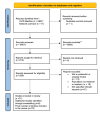Climate change, air pollution and maternal and newborn health: An overview of reviews of health outcomes
- PMID: 38785109
- PMCID: PMC11117177
- DOI: 10.7189/jogh.14.04128
Climate change, air pollution and maternal and newborn health: An overview of reviews of health outcomes
Abstract
Background: Climate change represents a fundamental threat to human health, with pregnant women and newborns being more susceptible than other populations. In this review, we aimed to describe the current landscape of available epidemiological evidence on key climate risks on maternal and newborn health (MNH).
Methods: We sought to identify published systematic and scoping reviews investigating the impact of different climate hazards and air pollution on MNH outcomes. With this in mind, we developed a systematic search strategy based on the concepts of 'climate/air pollution hazards, 'maternal health,' and 'newborn health,' with restrictions to reviews published between 1 January 2010 and 6 February 2023, but without geographical or language restriction. Following full text screening and data extraction, we synthesised the results using narrative synthesis.
Results: We found 79 reviews investigating the effects of climate hazards on MNH, mainly focussing on outdoor air pollution (n = 47, 59%), heat (n = 24, 30%), and flood/storm disasters (n = 7, 9%). Most were published after 2015 (n = 60, 76%). These reviews had consistent findings regarding the positive association of exposure to heat and to air pollution with adverse birth outcomes, particularly preterm birth. We found limited evidence for impacts of climate-related food and water security on MNH and did not identify any reviews on climate-sensitive infectious diseases and MNH.
Conclusions: Climate change could undermine recent improvements in maternal and newborn health. Our review provides an overview of key climate risks to MNH. It could therefore be useful to the MNH community to better understand the MNH needs for each climate hazard and to strengthen discussions on evidence and research gaps and potential actions. Despite the lack of comprehensive evidence for some climate hazards and for many maternal, perinatal, and newborn outcomes, we observed repeated findings of the impact of heat and air pollutants on birth outcomes, particularly preterm birth. It is time for policy dialogue to follow to specifically design climate policy and actions to protect the needs of MNH.
Copyright © 2024 by the Journal of Global Health. All rights reserved.
Conflict of interest statement
Disclosure of interests: The authors completed the ICMJE Disclosure of Interest Form (available upon request from the corresponding author) and disclose no relevant interests.
References
-
- World Health Organization. Climate change and health. 2021. Available: https://www.who.int/news-room/fact-sheets/detail/climate-change-and-health. Accessed: 10 August 2023.
-
- Intergovernmental Panel on Climate Change. Climate Change 2022: Impacts, Adaptation and Vulnerability. In: Pörtner HO, Roberts DC, Tignor M, Poloczanska ES, Mintenbeck K, Alegría A, et al, editors. In: Climate Change 2022: Impacts, Adaptation, and Vulnerability. Contribution of Working Group II to the Sixth Assessment Report of the Intergovernmental Panel on Climate Change. Cambridge, UK: Cambridge University Press; 2022. Available: https://report.ipcc.ch/ar6/wg2/IPCC_AR6_WGII_FullReport.pdf. Accessed: 20 May 2024.
Publication types
MeSH terms
Grants and funding
LinkOut - more resources
Full Text Sources
Medical

